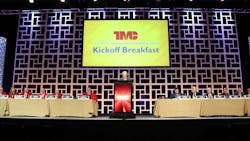The world is changing fast, and trucking industry must, too, says DTNA CEO
ORLANDO, Florida—Daimler Truck North America CEO John O'Leary said he's had the opportunity “to reflect on our deeper purpose." He was referring to Daimler Truck's split from the German vehicle maker’s Mercedes-Benz passenger car business in regard to the company as a whole, along with dealer partners and customers.
“Without us—without you—the world would be a much different place,” O’Leary offered to a packed crowd eating breakfast at the Hyatt Regency Orlando ballroom during the keynote at American Trucking Associations’ Technology & Maintenance Council 2022 annual meeting. The attendees comprised trucking stakeholders from North American fleets, maintenance providers, technology companies, and manufacturers.
See also: More TMC 2022 coverage
O’Leary, who has been in the role since last year, called them—and all those in the transportation industry—“heroes of our world” for their efforts overcoming the endless convoy of challenges since the last TMC annual meeting in February 2020, which started with an unprecedented pandemic and continued disruptions to the supply chain.
“Whether it's a UPS driver bringing packages to our doorsteps, the over-the-road driver getting raw materials to manufacturing plants, or the distribution driver getting food to grocery store shelves, the importance of their work is both more visible and more undeniable than ever before,” O’Leary explained, “which means we have a solemn responsibility to continue keeping those customers on the road."
As the world and global economy shift, these drivers and those who support them must also contend with an aggressive push to increase road safety and decrease vehicle-related emissions bringing large-scale technological changes to the industry.
“It begs the question of how we continue to do this in the long term,” he said.
That’s not a question that can be fully answered in a 30-minute keynote, but O’Leary did provide some examples of how the world in which trucks operate has rapidly changed.
Consumers driving the shift
This starts with global commerce and consumer buying habits and a severe shift to ecommerce. Many who once made regular trips to the grocery store now shop on their phone and schedule deliveries right to their front door.
“That will last long beyond the recent crisis,” O’Leary predicted. “It's evident in figures supplied by the Bureau of Transportation Statistics: The value of freight shipments by truck will increase nearly two-fold from 2018 to 2045. Additionally, according to ecommerce research, final-mile delivery is expected to grow by an exceptional 15% in just the next four years.”
As the acceleration of this change ramps up, so too will customer expectations for when goods arrive—not just food, but furniture and pharmaceuticals as well.
“Consumers expect their purchases to arrive faster than ever before, evidenced by the fact that two out of every three online buyers say that shipping times influenced whether a product is bought and where it's bought from,” O’Leary noted.
This will lead to a record number of commercial vehicles on the road to meet consumer demand, he noted.
“Our industry is expected to transform in numerous ways of our own—greater safety, reduce congestion, and with both regulatory and consumer pressure to drive toward decarbonization,” O’Leary said. “Any one of these three goals require technological innovations that by themselves would have historically taken decades to accomplish. Instead, we're looking at doing all three at once and against an aggressive timeline.
World changing as fast as data can move
The world is changing so fast that it looked different from when those attendees started breakfast to when they grabbed lunch. It was announced diesel fuel averages surged almost 75 cents over the past week, and that was before President Joe Biden announced a ban on Russian oil imports to the U.S. in response to Russian President Vladimir Putin’s invasion of Ukraine. The day before, the U.S. Environmental Protection Agency proposed even tighter truck emissions standards, aiming to slash NOx emissions by up to 60% in 2045.
But whatever the challenge, O’Leary, who previously headed Mercedes-Benz Trucks in Germany, stressed the truck makers cannot churn out “science projects on the road,” and that all technological innovations need to have a practical benefit.
The way to do this is through generating and analyzing good data, O’Leary argued, which he said DTNA has done for a decade with the Detroit Connect Virtual Technician remote diagnostics system.
Data coming off the truck “help fleets and drivers make informed repair decisions within minutes of a fault event,” O’Leary said.
With the 3G sunset, soon that could go from minutes to seconds.
O’Leary said 4G “doesn't just double or triple connection speeds, it exponentially increases the connection by 14 to 15 times,” and when 5G takes over, that speed will improve up to 100 times over 4G.
“The rapidly increasing growth of this technology means that smart trucks will continue to roll out until the entirety of the nation's fleet is connected,” O’Leary said. “It also means that service operations will be better informed about what truck is coming in for service, why and what parts are needed when that truck arrives.”
Sensor technology, and advanced driver assistance systems (ADAS) specifically, have also helped address the safety issue.
O’Leary cited data from Bosch, which manufactures a litany of automotive parts and technologies, that ADAS such as lane-keeping assist and automatic emergency braking can reduce injuries from large-truck crashes by up to 23% and lower fatalities by up to 19%.
“I'm convinced improved capabilities for the technology will continue to show an even stronger benefit,” O’Leary said. He explained that as vehicles add more ADAS, they will be able to sense if a driver has had a medical emergency due to not receiving any inputs, such as steering, and can intervene and slow the truck to a stop. “This isn't science fiction,” O’Leary said. “This is technology that's available now for new trucks.”
Move to zero emissions
In regard to global concerns over climate change and trucks’ impact on emissions, O’Leary pointed out the Class 8 market-leading Freightliner Cascadia improved fuel efficiency by 35% since being launched in 2007.
“We've been able to improve it in large part because of the aerodynamic efficiencies we've applied and the improvements to our Detroit engines,” O’Leary explained. “Much of that was done as we reacted to what our customers were asking for.”
O'Leary also gave credit to the government-funded SuperTruck program.
“We were able to experiment with technologies we may not have been otherwise able to do,” he said. These included aerodynamic enhancements and weight-reduction strategies that DTNA engineers brought to newer iterations of the Cascadia. OEMs including Navistar, Paccar, and Volvo Trucks North America also participated in the program, which has also led to significant efficiency advancements.
Engineers from all four OEMs discussed their efforts with SuperTruck 2 following the keynote. The findings for each OEM are expected by the end of the year.
O’Leary also touched on Daimler Truck's hydrogen fuel cell powertrain efforts via a joint venture with Volvo called Cellcentric. These are expected to provide longer ranges from trucks, whereas battery-electric vehicles are limited by a range of a few hundred miles.
DTNA’s overall sustainability goal in the U.S. is to become exclusively CO2-neutral by 2039.
Answering how to charge these zero-emission trucks will not be easy, O’Leary admitted, though he added DTNA has signed a memorandum of understating with NextEra Energy Resources and BlackRock Renewable Power “to establish a network of accessible chargers, collectively worth committing $650 million to address one of the largest hurdles to zero emissions to the future.”
O’Leary concluded with a call to action for the entire commercial vehicle industry. “I implore each of you, each of your shops to start preparing for these shifts now,” he said. “This isn't tomorrow. This isn't next week. This won't even be next year. But the shift is coming, and we must embrace it and start to plan for it.
“It won't be easy or inexpensive, or without the occasional rough patch," he continued. “But we will continue to move this industry forward. We have accomplished so much already. But that was in the past and the road is ahead of us—not behind us. This industry is not going to slow down, and I for one wouldn't want to be part of it if it did.”
About the Author
John Hitch
Editor
John Hitch is the editor-in-chief of Fleet Maintenance, providing maintenance management and technicians with the the latest information on the tools and strategies to keep their fleets' commercial vehicles moving. He is based out of Cleveland, Ohio, and was previously senior editor for FleetOwner. He previously wrote about manufacturing and advanced technology for IndustryWeek and New Equipment Digest.

